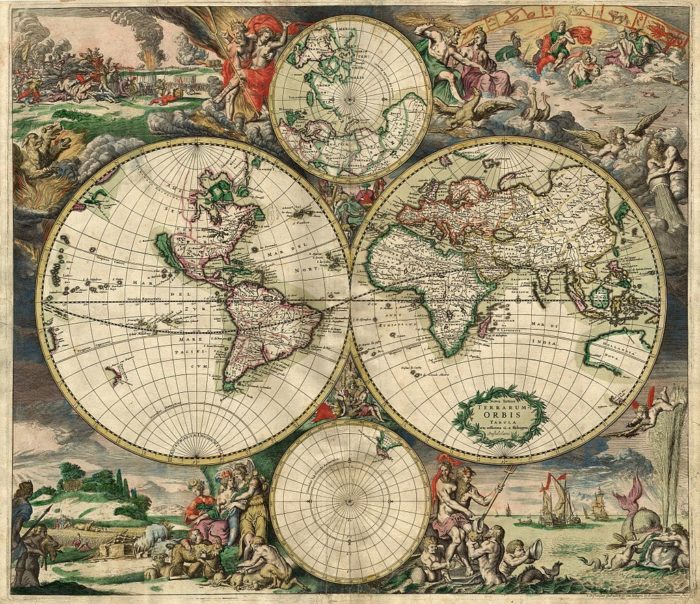Is Speculative Fiction A First World Pastime?
I doubt if there are any studies to prove or disprove the idea that speculative fiction is a first world pastime. To clarify, “first world” according to the Urban Dictionary refers to an informal classifications of countries:
The world classes (first, second, and third) have no official definition, but are often times used to describe the economic position of a state. The differences between the classes has less to do with the economic well being of the nation, and more to do with the geopolitical divides that emerged during and after the cold war.
First world is generally defined as a western style state that is usually capitalist and democratic, which has a high standard of living.
I’ve lived in a couple third world countries, one underdeveloped and largely agrarian, the other developing with a greater mix of urban and rural society. What do people from those nations think of speculative fiction—from gaming, comic books, movies or TV, and novels? Do they engage with science fiction? With fantasy? With horror? Or are those broad-brush genres only interesting to first world countries?
At the level of literature, speculative fiction depends on a literate society, so that must be in place for a country to have any awareness of the stories that are available. Second, a certain level of economic achievement seems necessary for people to spend money going to the movies, buying TVs, DVDs, computers and computer games. And finally, a significant amount of time seems necessary for people to spend reading or gaming.
But I have to wonder. Speculative fiction, at its core, involves the struggle of good against evil, so doesn’t that idea indicate that our stories are for everyone? Aren’t people in Sudan and Nigeria and Ukraine and Bolivia and Yemen concerned with despots and evil empires and heroes and struggle?
 I think those elements and themes are universal, so I want to say speculative fiction is for everyone. But I wonder. Are the day-to-day conditions for people not living in a first world country perhaps too close to the pretend conditions of our speculative fiction. I mean, many don’t have to imagine a government depicted in dystopian, or war shown in epic fantasy or ostracism or alienation portrayed in a science fiction. They live with despotic governments, the dangers of war, unfair treatment based on ethnicity. Why read speculative fiction if you only have to look out your window to see the clash of good and evil.
I think those elements and themes are universal, so I want to say speculative fiction is for everyone. But I wonder. Are the day-to-day conditions for people not living in a first world country perhaps too close to the pretend conditions of our speculative fiction. I mean, many don’t have to imagine a government depicted in dystopian, or war shown in epic fantasy or ostracism or alienation portrayed in a science fiction. They live with despotic governments, the dangers of war, unfair treatment based on ethnicity. Why read speculative fiction if you only have to look out your window to see the clash of good and evil.
Add in one more factor. Many of the third world nations have a greater awareness of the supernatural than do those of us in the first world. For instance, in his books Seeking Allah, Finding Jesus, Nabeel Quereshi, of Pakistani descent, pointed out that many Muslims put great trust in dreams as a guide for their future.
Of course, Hinduism is predominant in India, and that belief system relies on any number of supernatural elements. Buddhism likewise starts with the the ultimate goal of spiritual enlightenment, achieved over many lifetimes of rebirth.
Other places in the world believe in animism, a kind of pantheism that sees all things as possessing a “spiritual essence.” Still others cling to a form of indigenous beliefs that have been labeled as “superstitions.”
While the latter can identify with the ultimate struggle between good and evil, some of the other religions see the world through a different lens. What does speculative fiction say to them?
And should we care? Is speculative fiction only for the first world, and are we to accept the idea that no one apart from first world individuals will benefit from science fiction and fantasy?
I suspect that some who love these genres will argue that “benefit” is not the goal. That speculative fiction is nothing more than entertainment, that we are to let every culture find their own entertainment and not concern ourselves with what they do or don’t do in their free time.
 I have to wonder about that position. I mean, as many have pointed out before, Jesus told stories. The Bible is filled with stories. And at least on two occasions someone in Scripture told a story that would have to be identified as speculative. The Bible, remember, was not originally written to first world cultures. Jesus didn’t come and live during the internet era, or during the industrial revolution.
I have to wonder about that position. I mean, as many have pointed out before, Jesus told stories. The Bible is filled with stories. And at least on two occasions someone in Scripture told a story that would have to be identified as speculative. The Bible, remember, was not originally written to first world cultures. Jesus didn’t come and live during the internet era, or during the industrial revolution.
He spoke to third world Middle Easterners and He included stories that they understood but that we today also can understand.
I realize that no one who writes fiction is writing Scripture. Nor are we preaching sermons. But as we engage in the thematic base of speculative fiction—the struggle between good and evil—I wonder if our reading audience might not reach beyond our own borders. Is there any better way to bridge the gap between disparate worldviews than through story? And particularly through speculative stories?










































Sometimes stories seem like the best or only way to truly express world views to people of vastly different cultures. When a belief system is defined for someone, that someone may understand the concept on a cognitive level, but they aren’t going to truly internalize that understanding in many cases. But if they start reading stories they love that express that concept, they can feel and understand how that concept applies in an actual situation. They can then feel some of the nuances of that concept, or even understand what it’s like for someone that grew up with that concept as a part of every day life.
Missionary work is a good thing, but sometimes traditional missionary work seemed to fall short when it came to giving people the full context for Christianity, Christ’s message, etc. Good stories can probably help with that, or at the very least make people interested enough in the subject that they will be open to hearing what Christians have to say.
As far as whether people in third world countries would want to hear speculative stories, many probably would. Stories have many purposes, the primary ones being to alleviate boredom, provide escapism, venting, or aiding problem solving. We often don’t realize these are our motivations when we read, watch, etc, but they are there. So if someone is struggling, they may pay more attention to a story with similar issues because they want to hear how the characters solved their problems. Or, a struggling person may need a break from everything and read a story to distract them with escapism. Though even a story that is full of escapism may still contain many of the real life problems they face.
One time I posted a list of questions about stories on a forum I used to frequent a lot. One of the questions was something along the lines of ‘What is something that makes you want to avoid reading/watching a particular story?’ One person answered that they can’t stand reading stories that contained violence toward women. They know that happens in real life, but said that doesn’t mean they want to read about it in a story. Other people I’ve seen handle it differently. They want those things to be in a story so that society can talk about it and keep it from happening. Or maybe so they can vent about it or have a story that acknowledges and speaks to circumstances they went through.
Different people approach the issue differently. Many in every nation will be interested in stories(and probably have plenty of local tales in their community). But different types of stories will speak to different individuals in every population
The only thing I disagree with, Autumn, is your comment on missionaries. Their lives are the “stories” that people of other cultures see. There’s very little “preaching” except to the hungry hearts of new believers.
Becky
To an extent. My comment wasn’t toward all missionaries, neither was it to say they don’t do any good. But looking back at history, some missionaries didn’t seem to do all they should have in helping converts truly understand Christianity.
Well, I suppose no group of Christians is perfect, but remember who writes history, Autumn. Read some missionary biographies and you get a larger perspective than what a disbelieving textbook writer will give you.
Becky
I have read some missionary biographies/stories, and I think those particular people did a lot of good work. I don’t only rely on textbooks for info(You’re also acting like no textbook writers are Christians…). That doesn’t mean there aren’t things people can be more aware of when spreading the gospel, or that there haven’t been some issues in the past.
Point well taken! World folklore (which I often draw from) often contains speculative elements. For instance, the Iraninan tale “Urad, or The Fair Wanderer” has magical transformations, an unlikely heroine, and talking animals! I recall reading once, as well, from a female missionary to Iraq about the fondness for stories that the peoples Middle East (which, lest we forget is the homeland of Queen Scheherazade!) have. She tells how the women weave tales to each other of romance and adventure, and how well they relate to Hagar. ( I can find the link if anyone’s interested) I definately think there would be a place for speculative fiction in the third world. It’s getting it there, that’s the problem!
Great observations, Tamara. As I read your comment, I thought of the tales that have come to us as “Ali Baba and the Forty Thieves,” with underpinnings in the Middle East.
And I agree that translation and distribution is probably the greatest obstacle in making the books available. That would be a project for some farseeing publisher! But to a lesser degree, and maybe as a starting place, we have the internet.
Becky
Myths have existed since prehistoric times. The Elder Edda and Beowulf have been around long before LOTR. Much of the good magical realism comes from Latin America.
I have a theory, backed by nothing, that us first world folks are the only ones in history to twist ourselves into knots wondering if someone, somewhere has a problem with something we’re doing.
Note that as someone who has traveled to 32 countries, including parts of the Middle East, Africa, and Latin America, I can tell you that the movies that the United States produces influence the entire world. This includes speculative fiction movies–which are watched all over the world.
Currently, I would say the number of speculative fiction fans is increasing in the Developing (or “third”) World. But that fiction in general is not as popular in poor countries as it is here.
Note however that I find the existence of speculative fiction is not uniform across the so-called “First World.” English, German, and Russian have lots of speculative fiction works. French has less and Spanish less still. I don’t believe works of speculative fiction are particularly common in the Scandinavian languages, either (but they all pretty much can read English anyway).
So it’s actually the English language that’s the worldwide center for speculative fiction, with most works happening in the “First World.” But some small amount of speculative fiction is also coming from countries in the Developing World…almost all in the English language…
Listening to some indie author podcasts, supposedly a lot of Germans learn English partly for the sake of reading stories, which was pretty interesting to hear.
I’m actually from Germany, but I’ve never heard anybody say that. Still might be true, though. My reasons for learning English after I finished high school were different, but now that I am fluent in English, I have been doing my recreational reading in English for over a decade now, just because I think there’s always bits that get lost in the translation process.
Yeah. Interestingly enough, one reason I heard for some Germans learning English for the sake of reading is that they didn’t care for the German translations of certain stories.
If that’s the case, I can’t blame them. One reason I want to learn Japanese eventually is because I know that some English translations really butcher the original Japanese script in anime. So learning the original language that a story was written in is sometimes the best way to fully appreciate that story.
Sasch, I am curious about speculative fiction written in German. I can read German, by the way, but I mostly read the Bible in German (which sounds strange I’m sure, but it’s to meet the goal of maintaining the German I studied decades ago and also read the Bible–I do Bible reading in a foreign language for a variety of languages, actually). I read very little fiction in German.
I have heard from people I have confidence in that there are plenty of science fiction stories written in German–which is in contrast to say, French or Spanish, in which relatively few speculative fiction stories are produced. But I don’t really feel I know that’s true for certain.
Do you read speculative fiction originally written in German? Can you comment as to how popular speculative fiction is in works originally written in German versus works translated from English?
I’m really interested in what you have to say on this subject. Thanks.
Not sure that I can help you out much. Although I am ethnically German, I have a bit of a mixed cultural background. I was born in the USSR and my church background is more Mennonite than anything else. Speculative fiction wasn’t a big part of my growing up years. I got more into it in recent years after I left Germany and was already fluent in English. The only German spec fic novel I remember reading was by a guy called Wolfgang Hohlbein. He seemed to be a very successful German spec fic writer.
Btw, I understand you reading the Bible in a foreign language. I read the Bible in Spanish when I took lessons. I feel like it helps learning another language, since you’re already familiar with the stories.
Honestly that’s 75% of my reason for learning Japanese.
Are you actually learning Japanese? Have learned Japanese? Or are you simply interested in learning Japanese?
I don’t think that speculative stories are just a first world pastime, but I do think that it does depend on where you live and what you have access to. I live in remote village in a developing third world country, where only one family has a TV. People in more urban settings with more access to TVs and cinemas seem to consume a fair amount of speculative stories, although mostly in the horror genre. In fact it feels like half of the locally produced movies for the cinema are part of the horror genre.
In my particular village there are other hurdles before people could ever start consuming stories of any sort. One problem is that a lot of the adults can’t read or else read very slowly. The problem gets compounded by the fact that there are several hundred languages spoken in this country. Stories would usually be available in the national language, which for many is not the mother tongue.
Another hurdle is that people don’t necessarily understand the nature of fiction. At one point half the village would flock every evening to the house with the TV and watch some soap opera. In one of the episodes the main character appeared to have died. The next day some teens saw another episode (the next one, or else a rerun) and were surprised / confused that he was alive again. After some explanation they were upset about having been lied to, since the show made it look like the character died, when he really hadn’t. And I’m not even sure that they realize the difference between actor and character.
Another problem with speculative stories that I could see in this particular setting is that people would not necessarily perceive speculative stories (aside from science fiction maybe) as mere fiction, due to the prevalent animistic and/or superstitious worldview.
Another problem has less to do with the nature of speculative stories themselves, but that concepts and characters don’t always translate across a cultural divide. In the missionary story “Peacechild” the natives cheered Judas as the hero of the story for his betrayal of Jesus. Or what we in the west imply about the nature of dragons is probably vastly different from what Chinese people would imply. Here where I live the term giant would be tricky to bring across, because it seems to imply more than just a tall person. It also seems to imply an evil nature and often refers to demons.
Despite all that, people the world over enjoy telling and hearing stories. And as I interact with the people here sometimes I’m just amazed at peoples’ innate ability to tell an engaging story, even if it’s just recounting everyday life occurrences.
That’s pretty interesting. Is there a cultural reason for the popularity of horror where you’re from?
Not that I was able to find out. One guy I talked to said he was watching it for laughs, because he thought it funny what other people find scary. I think us Westerners would probably react similarly to locally produced horror movies, which is less a statement about their production value and more about the difference about what we fear.
I may have been slightly exaggerating too, about exactly how many horror movies are being produced here, but it sure feels like a lot.
It is pretty interesting to see what different cultures find scary. Though I suppose there’s a lot of horror movies in the United States that actually are made to be funny. I don’t really watch horror, but I’ve seen commercials for some that were clearly meant to be funny or just plain weird.
I think one was called Thankskilling. Basically, it seemed to be about one of those already dead/plucked/butchered frozen Thanksgiving turkeys people buy at the store. Apparently the movie was about that frozen turkey coming to life and stabbing people. So it was probably supposed to be vaguely creepy, but also ridiculous enough that people would laugh at it instead of feeling scared.
Since Thanksgiving with eating turkey and all of that is really only a United States thing and since eating frozen turkeys at all is not a thing in much of the world, this is a story that people outside of the USA might not understand the background for.
Though this might have the effect of people from outside the USA finding the story scarier than people with the cultural background for the story to make sense…maybe.
Maybe. It may not have been a frozen turkey, either. It’s been a long time since I’ve heard people talk about it/seen a commercial for it, so I don’t remember exactly, other than it was Thanksgiving themed and the turkey was going around trying to kill people.
Sasch, I can only think of a few circumstances in which a person would not specifically state what country he or she is in, though what I’m thinking of may or may not apply to you at all. Still, I did find it interesting that you didn’t say where you live…and you also said you originally are from Germany.
Yes, in countries that are very linguistically divided and which have low literacy rates, getting people to read fiction at all is difficult, let alone write it. Yet I think even in such countries there is a small base of people who are potential (or actual) speculative fiction fans. Mostly university students, but also certain educated professionals that every country has some of, like doctors and engineers. Yet in some places, even this potential base of fans is not really interested in speculative fiction.
What perhaps can illustrate this is a country like Mexico, which has some areas of extreme poverty and also has some very wealthy areas, in which literacy is relatively high and which other than in certain areas of the country (granted, the poorest ones) everyone speaks and reads Spanish. Many of the barriers to speculative fiction you mention don’t exist in most of Mexico–yet soap opera type stories are easily the most popular kind of story in Mexico, which has very little indigenous speculative fiction.
Oh, speculative fiction books and movies certainly are popular there, but via translation of works by English-language writers. Especially YA stories like The Hunger Games are popular–and I think that’s because the demographic of people who like speculative fiction in Mexico are mostly young people.
In fact, in general, the Spanish language does not produce many works of speculative fiction at all. So a very literate person from Madrid or Monterrey or Montevideo who loves science fiction is more likely to read translated works than what’s written in Spanish. Yet someone who is from, say, Botswana or Nigeria who reads English will have no trouble finding science fiction written in English.
I’m not sure if my point here is coming across well at all, but I find the fact the English language is the center of speculative fiction production in the world to be more significant than the fact that most speculative fiction comes from the “First World.” It is wholly possible for a country to be wealthy enough to afford the luxuries of fiction–and still not be interested in speculative fiction.